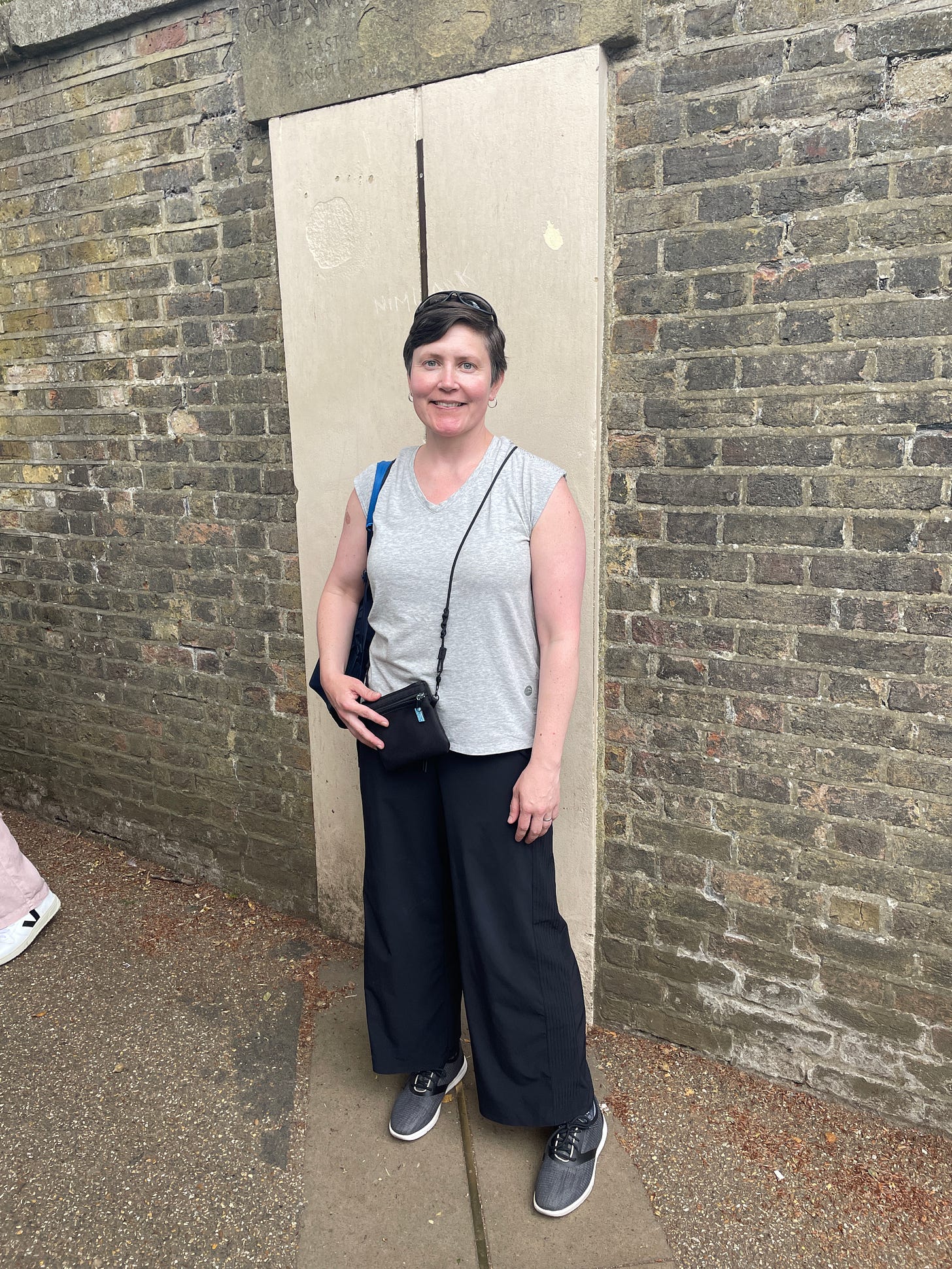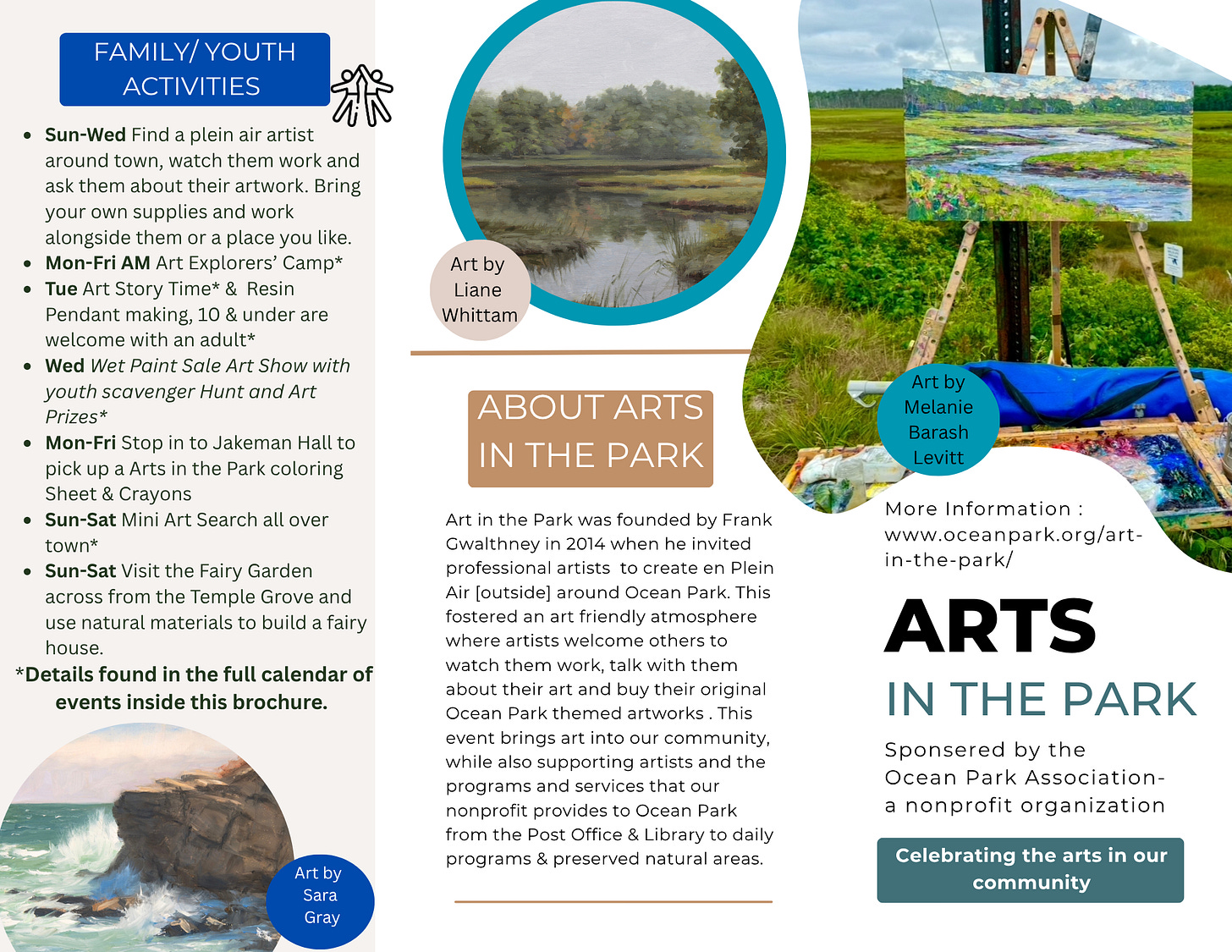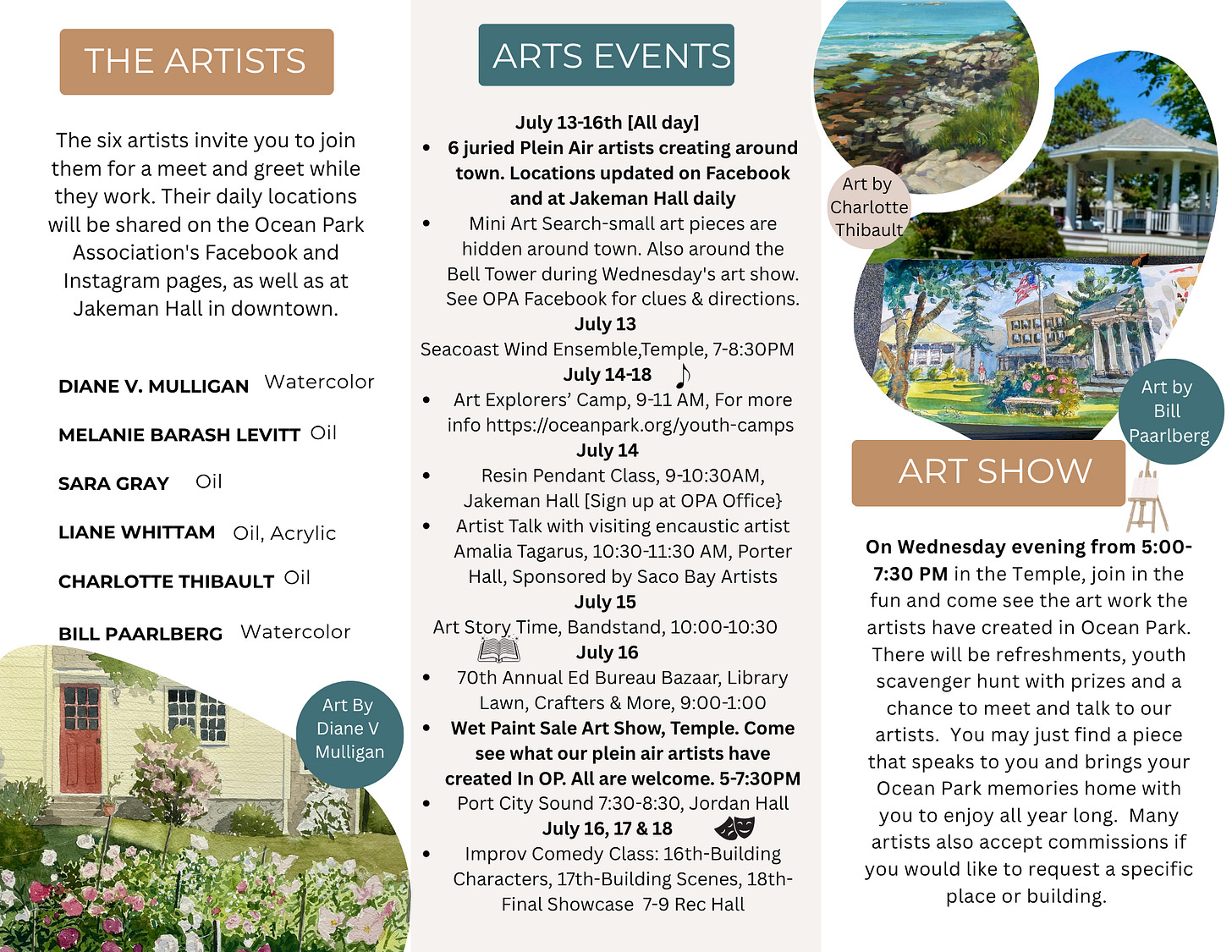Week 5 Recap
Hello, friends!
Well, here we are, entering week 6, nearly halfway through the program, and here’s what I’ve learned so far: I need “creative recovery” as much as a teetotaler needs AA.
That said, I am really am enjoying morning pages. I only hold myself to writing them 4 days a week, and then one day I write this post instead, and another day I proofread this post instead, and I take one day off. I’m enjoying the routine of it.
In week 5, I did try to focus more in terms of what I wrote about in my morning pages, thinking actively of the big question that brought me to the Artist’s Way in the first place this summer: Is it okay that I haven’t been writing fiction lately?
I spent my twenties and thirties desperately trying to be a writer, pursuing my dream of writing novels with fevered devotion, and learning along the way to boldly declare myself a writer, a declaration that enabled me to prioritize time and space in my life for writing. Then, in COVID times, more or less on a whim, I decided to go ahead and get the MFA in creative writing I always wished I had. I applied to an online program, got in, and spent most of my free time for two years completing my coursework, graduating in December of 2022.
But a funny thing happened about partway through the program: I started painting again. My daily life at school was tethered to a computer more than ever because of COVID, and then at home I was spending tons of time at my computer for my MFA classes, and I need a break, something that took me away from screen time that wasn’t baking, because really I can only eat so many cookies. I got out my old acrylic paints, discovered most of them dried in their tubes, got some new paints, and the rest of history. By the time I graduated with a degree in creative writing, I was much more interested in painting—I bought my first watercolor set in the summer of 2021 and became totally obsessed—than in working on my fiction.
And now, a few years later, rapidly approaching ten years since I wrote my last full-length novel, I can’t help but wonder: Is the fact that I have stopped writing okay?
So I explored that question intentionally this week in my morning pages, and I have concluded that, actually, yes. It is indeed okay. Don’t get me wrong. I’m not saying I’m giving up writing fiction forever. I still have stories in my head and perhaps I’ll feel moved to write them down sometime in the future, but I no longer feel the need to put pressure on myself to hurry up and write them down. I don’t have to feel guilty for painting when I “should” be writing. At this moment, my creativity wants to express itself visually, and that is completely okay.
That said, I really enjoying writing these posts and my monthly newsletter. It’s still writing, just a different mode. All is well. In fact, I’ve been interested in essay writing for a while but I haven’t consistently made time for it, and that’s a direction I want to explore more, perhaps making a weekly Substack blog an ongoing routine beyond the 12-week structure of these Artist Way reflections. Maybe. We’ll see. The academic year does tend to crush goals that lofty.
What else happened in Week 5? I actually didn’t do a specific artist date. I might be done with artist dates, because, as previously discussed, my whole dang life is basically an artist date. For instance, I spent Monday painting outdoors. It was supposed to be a meeting of my plein air group, but only two of us showed up, and we wanted to paint different things, so we didn’t hang out beyond saying hi in the parking lot. I spent a lovely morning all alone painting. Actually maybe that was my artist date, because I played with some new supplies—Neocolor I “wax pastels”, which are very luxurious grown up crayons—to make a mixed media piece instead of my usual traditional watercolor.
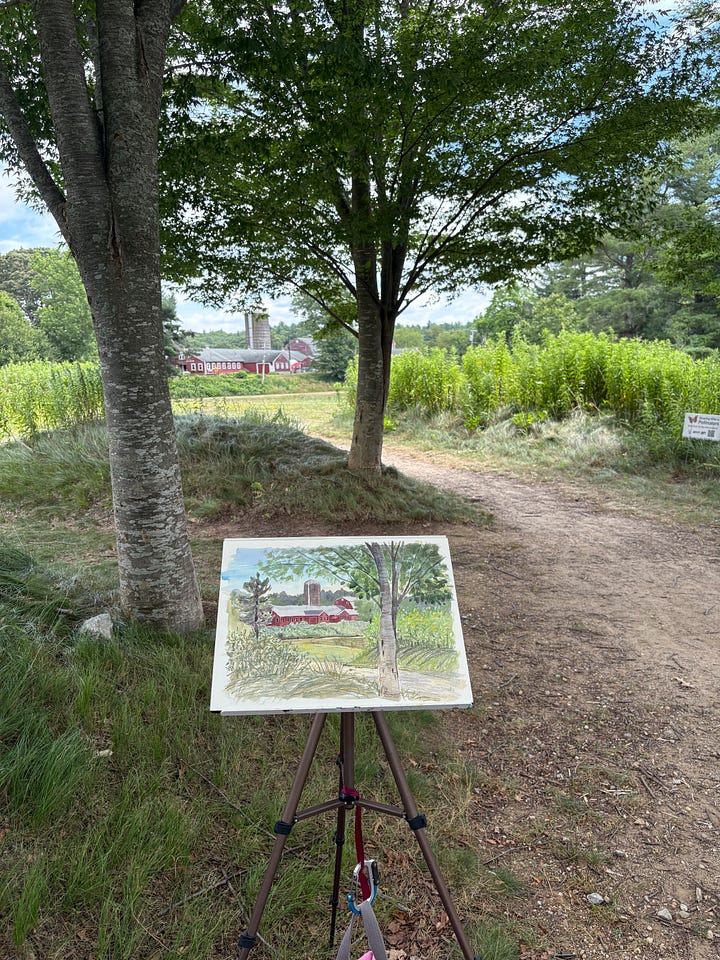
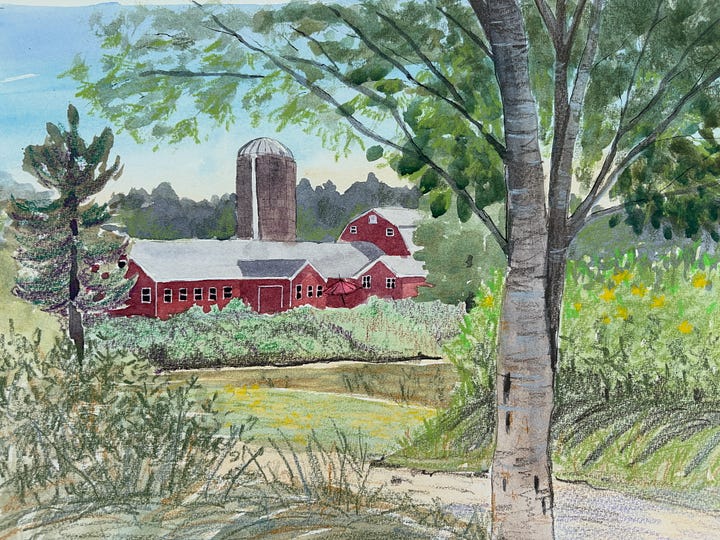
I don’t have to go out of my way to schedule artist dates, so I’m not going to worry about that throughout the rest of the program.
Looking Ahead to Week 6
If you’ve been following along throughout the past five weeks, you can probably anticipate my criticisms of this chapter, mostly about Cameron’s insistence on an interventionist God, so I’m going to skip my complaints. Go back and read Week 5 if you want to hear where I stand on that. Instead, I’m going to talk about what I appreciated in this chapter.
I do think it’s important to cultivate an Abundance Mindset, in fact it’s something I’ve been actively working on for the past few years.
For most of my adult life I had this narrative in my head that went something like this, “I can’t afford X, Y, or Z because I’m just a poor teacher.” This way of thinking would pop up about necessary expenses like car repairs and obligations like traveling for family weddings and for luxuries like vacations. When I was young and at the bottom of the pay scale, it’s true that I lived paycheck to paycheck and a single large unexpected bill could throw my finances into a tailspin, but it’s a long time since then.
I still remember when I realized that my husband and I could actually afford to take a weeklong summer vacation instead of just a budget long weekend. The unbelievable luxury of it! We weren’t broke anymore! Our weeklong rental was the world’s tiniest Airbnb (with a commensurately cheap price tag) with a brutally uncomfortable bed but it was in a gorgeous location and it was all ours for the week.
That wasn’t the tipping point in my mindset, though. For many more years, my knee jerk reaction to any large expense was “I can’t possibly afford that.” I’m not sure what exactly happened to make me start questioning that idea. Maybe it was when I was reading some of Byron Katie’s work on radical acceptance, but at some point, maybe three or four years ago, when I had some unfortunate bill to pay, and I heard that little complaining voice in my head and said, “Wait a minute, that’s not true.”
In the years since, I’ve tried to be honest in my language about money. Instead of “I can’t afford that,” I pause and think about what’s really going on. Often when my initial thought is that I can’t afford something, the truth is that I don’t want to.
For example, I never want to spend $1000 new tires for my car, but I can actually afford to buy new tires. So now I try to practice gratitude instead of letting a scarcity mindset takeover. Well, I don’t really want to spend $1000 new tires, but I’m grateful to be so blessed in this life that I can afford new tires to keep my car in good order.
I cannot really express to you how much peace this small shifting in thinking has brought me.
And when I do want something and my initial reaction is that I can’t afford it, I sit down and take a very honest look at whatever it is I think want and at my finances, and then I decide what to do.
For example, I have recently been thinking about buying a new computer because the one I am typing this on (a basic Macbook Air) has been a disappointment. It’s only a year and a half old, and I bought it because I thought it was a great deal, but I didn’t do enough research and it doesn’t have the oomph I need. For instance, it can’t handle any real video editing. It’s fine for word processing and using the internet, but not much else. Running Chrome and even one other application causes heavy memory load issues. I could have spent hundreds less on a Chromebook and had a machine about as capable. (PSA: Don’t buy the entry level Macbook Air. It ain’t worth it)
If I were to buy a new computer, I would get a higher spec Macbook Pro (like the one I had for 10 years before replacing it with this one). Realistically, if that’s what I want, I can indeed afford it, and I’m grateful for that. But also, I don’t actually need a new computer. It’s true, I can’t edit videos on this one, but what do I want to edit videos for?
Last year, I thought maybe I’d try to start a Youtube channel, but I realized very quickly that actually I want to focus on my energy on living in the real world, not the virtual one, and I decided not to pursue the idea. And if I want to edit videos for school, I have a computer at school that can handle the task.
The majority of what I use my computer for is typing and using the internet, and this machine is fine for that. The large, high resolution screen and excellent speakers make it great from streaming Netflix, so that’s a plus. Further, I believe in trying to reduce my tech waste footprint by using my gadgets for many years, so it would not be in keeping with my values to hurry up and replace this computer. Really and truly this one is super good enough.
What’s really happening here is that I am annoyed with myself for not realizing this machine wouldn’t have enough RAM to do everything my old computer could do. But since I want to spend less of my life at a computer, it’s also totally fine. No need to buy a new computer.
Sometimes, thought, I decide that I can afford something and it will add real value to my life. For instance, after years of telling myself I couldn’t afford a trip overseas, in the summer of 2023 I took a two-week trip to the UK. I am so grateful that I could afford to do so, and I look forward to going back again at the next opportunity.
Having an abundance mindset isn’t just about buying stuff. It’s about mindfully consider how to spend one’s money. It’s about understanding what Cameron calls “authentic luxury,” a point upon which she and I are in total agreement.
That said, I do wonder if Cameron and self-help gurus like her are partly to blame for “little treat culture.” Back in 1992, women (Am I right in thinking this book is mostly for women? It feels like it.) maybe needed someone like Cameron to tell them it was okay to stop being so self-sacrificing and to treat themselves. Today, thanks to social media and smartphones, every day is treat yourself day, and it seems more people could benefit from pausing to consider authentic luxury vs. little treats.
Game Plan for Week 6
This week, I’m actually living my full-tine artist dreams. I’ll be participating in Arts in the Park in Ocean Park, Maine, a neighborhood of Old Orchard Beach, from Sunday through Wednesday. I applied on a whim back in the winter, and was shocked to learn I’d been accepted. Two decades of rejection from every writing event I ever applied me conditioned me the expect rejection, but to my amazement, I was invited to participate. How crazy is that? I bought my first watercolor set in 2021, and now, in 2025, I’m teaching watercolor and participating in juried plein air events. Turns out consistent and focused practice really does make progress.
I’ll be working outdoors for four days with the goal of producing 5 to 6 finished pieces before the wet paint sale on Wednesday evening. My only job for four days is to paint! And they even put one of my paintings on the flyer!
I do plan to continue doing morning pages most days even while I’m away. As for the tasks, most of them are already part of my usual life. I keep very careful track of my spending, my hubby and I have a robust rock collection from our shared habit of pocketing pretty stones, I grow flowers mostly so I can pick them, I get rid of clothes that don’t fit, I send postcards when I’m on vacation, I bake all the time. So I guess this week it’s just morning pages and living my life.
I’d love hear how things are going for all of you out there. Any light bulb moments? Any points of frustration? Please drop a comment and let me know!



